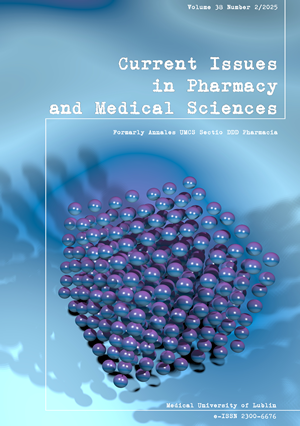Raspberry leaf infusion and fetal heart rhythm disturbances
DOI:
https://doi.org/10.12923/cipms-2025-0019Keywords:
pregnancy, fetal heart rate, cardiac arrhythmias, raspberry leafsAbstract
Fetal cardiac arrhythmias and conduction disorders represent the second most commonly identified issue within the circulatory system. Extrasystoles make up 80% of all prenatal arrhythmias, whereas tachyarrhythmias account for 10% and bradyarrhythmias range from 5-10%, making them less prevalent. The diagnosis of the specific type of arrhythmia is conducted through echocardiography. A 27-year-old woman, who was in the 38th week of a normal pregnancy, was referred to the Medical University of Lublin's Department of Obstetrics and Pathology of Pregnancy for a fetal echocardiography exam. The expectant mother consumed a daily infusion of raspberry leaves, totaling 3-4 cups (330 ml). Raspberry ketone (RK) is under investigation for its potential heart protective effects; however, there is no established safe dosage prior to delivery. After discontinuing the treatment, the fetal heart rate returned to a normal rhythm. This study is the first to link raspberry consumption with occurrences of fetal arrhythmias. Effective diagnosis of fetal heart rhythm disturbances relies on comprehensive echocardiography of the fetal heart and thorough interviewing of the pregnant patient. Premature delivery due to fetal heart rhythm issues, without a detailed analysis via echocardiography, is a significant oversight.
References
1. Macones GA, Hankins GD, Spong CY, Hauth J, Moore T. The 2008 National Institute of Child Health and Human Development workshop report on electronic fetal monitoring: update on definitions, interpretation, and research guidelines. Obstet Gynecol. 2008;112(3):661. https://doi.org/10.1097/aog.0b013e3181841395
2. Bravo-Valenzuela NJ, Rocha LA, Machado Nardozza LM, Araujo Júnior E. Fetal cardiac arrhythmias: Current evidence Ann Pediatr Cardiol. 2018;11(2):148-63. https://doi.org/10.4103/apc.apc_134_17
3. Huhta JC. Fetal congestive heart failure. Semin Fetal and Neonatal Med. 2005;10(6):542-52. https://doi.org/10.1016/j.siny.2005.08.005
4. Sile I, Teterovska R, Onzevs O, Ardava E. Safety concerns related to the simultaneous use of prescription or over-the-counter medications and herbal medicinal products: Survey re-sults among latvian citizens. Int J Environ Res Public Health. 2023;20(16):6551. https://doi.org/10.3390/ijerph20166551
5. Rasouli H, Farzaei MH, Khodarahmi R. Polyphenols and their benefits: A review. Int J Food Prop. 2017;20:1700-41.
6. Bowman R, Taylor J, Muggleton S, Davis D. Biophysical effects, safety and efficacy of raspberry leaf use in pregnancy: a systematic integrative review. BMC Complement Med Ther. 2021;21(1):56. https://doi.org/10.1186/s12906-021-03230-4
7. Rao S, Kurakula M, Mamidipalli N, Tiyyagura P, Patel B, Manne R. Pharmacological exploration of phenolic compound: Raspberry ketone-update 2020. Plants (Basel). 2021;10(7):1323. https://doi.org/10.3390/plants10071323
8. M Simpson. Raspberry leaf in pregnancy: its safety and efficacy in labor. J Midwifery Women Health. 2001;46(2):51-9.
9. Zielinsky P, Piccoli AL Jr, Manica JL, Nicoloso LH, Menezes H, Busato A, et al. Maternal consumption of polyphenol-rich foods in late pregnancy and fetal ductus arteriosus flow dynamics. J Perinatol. 2010;30(1):17-21. https://doi.org/10.1038/jp.2009.101
Downloads
Published
Issue
Section
License
Copyright (c) 2025 Author

This work is licensed under a Creative Commons Attribution-NonCommercial-NoDerivatives 3.0 Unported License.


